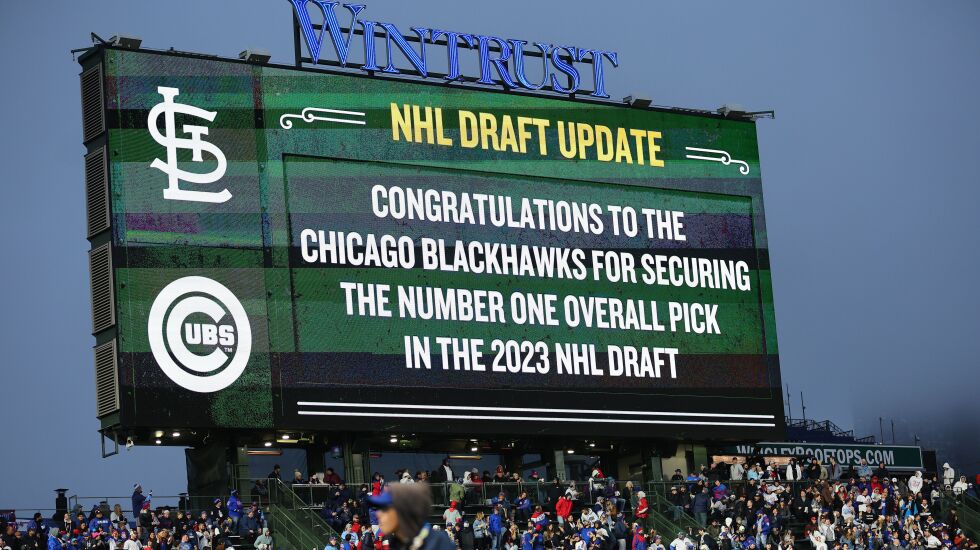
They got to the answer the wrong way — by making one of the worst NBA trades of the decade — but the Bulls will land in the right place Thursday: without a draft pick.
Drafts are the worst part about American sports. All drafts: not just the NBA version Thursday or the NHL one that a week later will hand-deliver the Blackhawks a generational prospect in No. 1 overall pick Connor Bedard. The Major League Baseball draft 10 days after that — where the Cubs pick 13th and the White Sox 15th — is a bore. The NFL draft averaged 6 million television viewers and totaled more than 300,000 in-person spectators in April. It’s the centerpiece of the league’s strategy to be omnipresent for all but 40 days each year — like Lent in reverse.
Drafts shouldn’t exist. That’s true even in a year in which they’ve been kinder to Chicago than any of the five major sports franchises have been.
Since 2010, three cities have claimed multiple first-round picks in the big four sports in the same offseason: Washington in 2010 (the Wizards’ John Wall and the Nationals’ Bryce Harper), Houston in 2014 (the Texans’ Jadeveon Clowney and the Astros’ Brady Aiken, who didn’t sign) and Philadelphia in 2016 (the 76ers’ Ben Simmons and the Phillies’ Mickey Moniak). Chicago would have been the fourth had the Bears not traded their No. 1 overall pick to the Panthers for DJ Moore, rookie tackle Darnell Wright and future picks, including a first-rounder next year that serve as Justin Fields implosion insurance.
Getting to that point felt, well, gross.
The notion that drafts improve a league’s competitive balance is baloney. They’re a way to keep incoming prospects’ salaries down, first and foremost. But their biggest sin is incentivizing fans to want their team to fail.
Losing teams sell hope. Perennial losers — and there are plenty around here — consider hope to be a suitable replacement for spending money, developing players and, well, trying. Replacing the draft with free agency for all eligible amateurs would eliminate that excuse.
Fans should hold their favorite teams accountable when they lose. Arranging a draft order in reverse order of finish allows teams to argue that losing is, in fact, winning. That becomes dangerous when fans actually believe them.
Did you enjoy rooting for the Bears to lose their last 10 games? Were you part of the fan base — particularly boisterous on social media — that cheered when Ihmir Smith-Marsette fumbled with a minute left at the Vikings’ 39 in Week 5? Or when, four days later, Darnell Mooney came was pushed out of bounds a paperclip’s length short of the goal line with 30 seconds to play?
When the Bears shut down Justin Fields after the season’s penultimate game — they claimed he had a hip injury but, c’mon, we all knew their Week 18 motivations — were you elated?
Didn’t you find it bizarre that you were?
What about when the Blackhawks GM Kyle Davidson made nine trades around the deadline, including moving perhaps the greatest player in franchise history, Patrick Kane? His decision to deal Kane was prudent, if painful, because it sparked a final stretch in which they lost 16 of their last 21 games. Were you among the fans furious when they beat the Penguins — 5-2, no less — in the second-to-last game of the season? Didn’t that make you feel, at the least, conflicted?
After all that, the Blackhawks needed to win the lottery to jump from having the third-best shot at landing Bedard to selling 1,200 full-season ticket packages within 12 hours.
And after all that, the Bears were destined to draft second — until the Texans’ Lovie Smith had the temerity to win the season finale. The Colts failing to bat down a fourth-and-20 heave helped, but Smith followed that touchdown with a decision to go for — and get — a two-point conversion.
Smith was fired within hours. Whether he would have been canned by the Most Dysfunctional Franchise in the NFL (Non-Commanders Division) regardless of the score is a worthy question, given that they also fired David Culley after just one season the year before. But the fact we have to wonder whether producing the Texans’ seventh win in 39 games was a fireable offense speaks to the lunacy of the only-real-fans-cheer-against-their-favorite-teams draft complex.
It’s been less than a decade since Mike Zarren, an assistant GM for the Celtics, proposed the next-best thing to eliminating the draft: using a wheel system that guarantees each team a No. 1 overall pick — and one each from No. 2 to 30 — in a 30-year cycle. No longer would the draft be determined by reverse order of finish. Teams would have to try, and knowing the draft order would allow them to be strategic about when they went all-in.
The NBA didn’t go for it.
Thursday, the Spurs will be rewarded for winning 27% of their games by getting the privilege of drafting 7-foot-4 Frenchman Victor Wembanyama, who, like Bedard, could be a generational star.
The Bulls could have tanked down the stretch to increase their odds of keeping their top-four-protected first-round pick this year. To call vice president of basketball operations Arturas Karnisovas noble for not doing so only makes sense in Draft World, where losing is winning.
Because he didn’t, the Bulls’ 2023 first-rounder went to the Magic as continued punishment for the catastrophic Nikola Vucevic trade in 2021. Their second-rounder was sent to the Wizards as part of the Otto Porter deal more than four years ago.
That leaves the Bulls without a single pick. If only we could say the same about every other team in the draft.







